Iran publicly executes man on alleged murder charges
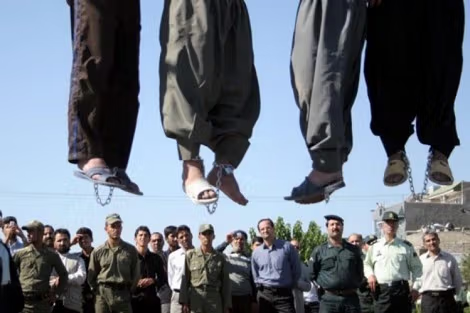
Iran hanged a man in public on Tuesday after he and his wife were convicted of murdering a mother and her three children during a robbery in October 2024, judiciary's outlet Mizan reported.

Iran hanged a man in public on Tuesday after he and his wife were convicted of murdering a mother and her three children during a robbery in October 2024, judiciary's outlet Mizan reported.
“One of the perpetrators of the brutal murder of four members of a family in Beyram, in Fars province, was hanged in public on Tuesday,” Mizan said.
Earlier in February this year, Iranian authorities hanged a man from a bridge in the northeastern city of Esfarayen, in the country’s first public execution of the year.
Iran remains one of the few countries to conduct public executions, a practice widely condemned by human rights groups.
Public hangings were halted in 2021 due to COVID-19 restrictions but resumed in 2022. That year, two people were hanged in public, increasing to seven in 2023 and four in 2024, according to Oslo-based rights group Iran Human Rights.
Iran has executed 800 people in less than eight months since the start of the year, including 30 political prisoners, according to Norway-based rights group Hengaw reported on Monday.
In June, Amnesty International warned that following the Iran-Israel conflict, Iranian authorities have called for expedited trials and executions, raising concerns over arbitrary use of the death penalty.
Last year, at least 975 people were executed in Iran, marking a 17% increase from the 834 executions recorded the previous year.
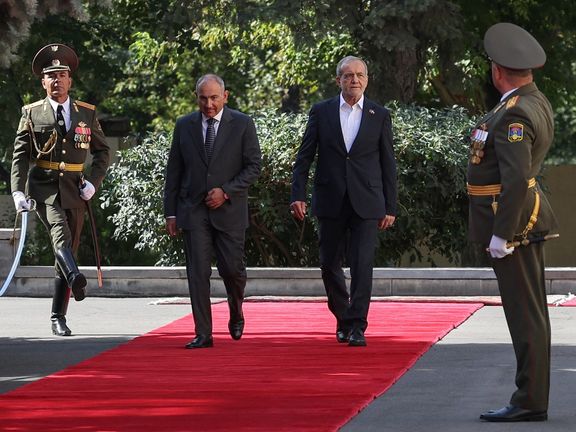
Iranian President Masoud Pezeshkian said on Tuesday that Tehran supported Armenia’s sovereignty and territorial integrity while voicing concern over foreign involvement near their shared border, as he met the Armenian premier in Yerevan.
“In my meeting with the prime minister of Armenia, I emphasized that the Islamic Republic of Iran firmly believes in preserving Armenia’s sovereignty and territorial integrity and maintaining warm, continuing relations between our two countries,” Pezeshkian said in a post on X.
“Our concerns regarding the presence of third-party forces near our shared borders must be fully addressed.”
At a joint press conference with Armenian Prime Minister Nikol Pashinyan, Pezeshkian expanded on those remarks. “Outsourcing the resolution of Caucasus issues to extra-regional forces will only complicate the situation in the region,” he said.
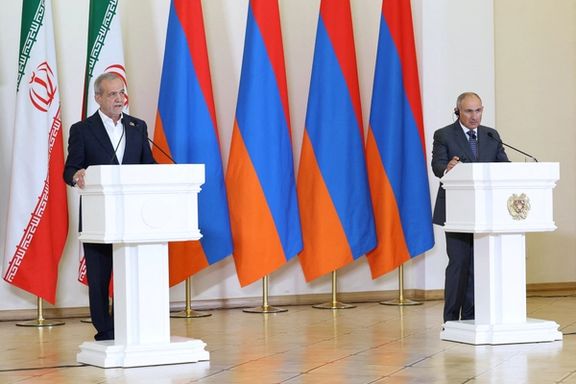
Pezeshkian also stressed that “Iran supports the peace talks between Azerbaijan and Armenia” and added that “both the government and the Supreme Leader of the Islamic Republic believe relations with Armenia should be expanded in all areas.”
The remarks come after a US-brokered peace deal last week between Armenia and Azerbaijan granted Washington leasing rights to develop the Zangezur transit corridor, now renamed the Trump Route for International Peace and Prosperity (TRIPP).
The deal allows a US company to build and manage the route connecting Azerbaijan with its exclave Nakhchivan, a project Tehran has repeatedly described as a geopolitical risk.
State media said Iran and Armenia signed several cooperation memoranda on diplomacy, tourism, mining, health, infrastructure and environmental issues during Pezeshkian’s trip. The two leaders also attended an official welcoming ceremony in Yerevan earlier in the day.
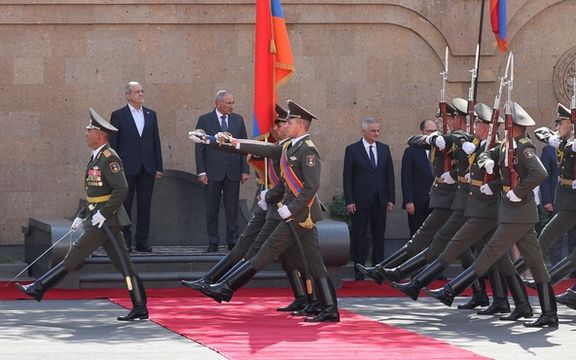
Customs and transport cooperation
Additionally, Iran’s Ministry of Roads and Urban Development announced an agreement with Armenia to expand transport infrastructure and revise customs charges on vehicles entering Iran.
Road Minister Farzaneh Sadegh, who accompanied Pezeshkian, said there was an “imbalance of about $330” in vehicle fees charged by the two countries, and that Yerevan had agreed to set up a joint working group to review the matter.
She also said that “new routes must not come at the expense of geopolitical changes.”
The ministry said Armenia would soon tender contracts for the completion of the North-South transport corridor linking Russia, Iran and India via the Caucasus.
Iran’s red lines
Iran’s foreign ministry has repeatedly expressed its opposition to a foreign presence in the South Caucasus.
Also on Tuesday, Foreign Minister Abbas Araghchi said, "Armenia will never allow its territory to be used as a threat against Iran,” adding that Yerevan had assured Tehran it is aware of Iran’s red lines regarding the Zangezur corridor.
Araghchi said last week, “Armenian officials have told us they have respected and paid attention to all of Iran’s red lines in this matter,” he said.
Foreign ministry spokesman Nasser Baghaei said on Monday, “We have been very clear that we are sensitive to the presence of extra-regional actors."
“For us, the unblocking of routes must not harm internationally recognized borders or contradict Armenia’s national sovereignty,” Baghaei said.
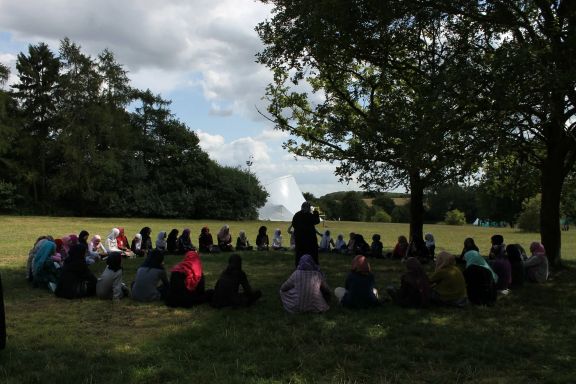
Conservative MP Bob Blackman has accused Iran-linked groups of exploiting Britain’s charity sector to spread influence, writing in an op-ed after the cancellation of a children’s camp in Hertfordshire he said was run by supporters of Iran’s Supreme Leader.
“The summer camp in rural Hertfordshire is just the latest example of how Iran abuses Britain’s charity sector, exploiting our commendable history of philanthropy to spread its tentacles and influence across our land, while sowing discord in our communities,” Blackman wrote for UK-based political website ConservativeHome on Tuesday.
The summer school camp known as Camp Wilayah, run by the Ahlulbayt Islamic Mission (AIM), was cancelled last week due to what its organizer described as safety threats, following accusations by a right-wing political party that it has ties to the Islamic Republic.
Blackman criticized other London-based groups including the Islamic Human Rights Commission (IHRC), and the Islamic Center of England, alleging that they have ties to Iran’s leadership and spread Tehran-backed narratives through UK-registered charities.
"Two other London charities with links to Iran, Dar Al Hekma Trust and Abrar Islamic Foundation, are currently being probed by the national terrorist financial investigation unit," he added.
Pointing to the government’s new foreign-influence registration rules, Blackman urged tougher action against “pro-Iranian regime activists” and questioned whether the IRGC would be proscribed by the United Kingdom.
“A start would be ridding our charity sector of extremists,” he said.
On June 30, a report by The Telegraph accused Iran of conducting a “shadow war” inside the United Kingdom that extends beyond sanctions violations and includes propaganda, financial networks, and digital disinformation campaigns aimed at dividing society
In July, John Woodcock, Baron Walney, the UK government’s former extremism adviser, said: “We cannot allow propaganda and influence from this theocratic dictatorship to be spread to children in the UK.”
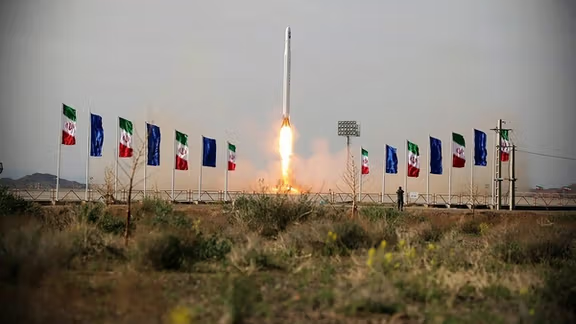
Iran plans to launch the first satellites in its new Soleimani constellation of narrowband satellites by the end of the Iranian year in March 2026, the head of the country’s space agency said.
Hassan Salarieh, head of the Iranian Space Agency, told the Tasnim news agency that the Soleimani constellation will be Iran’s first narrowband satellite network.
“In the initial phase, nearly 20 satellites will be built and placed in orbits with different inclinations to provide narrowband communications aimed at developing Internet of Things services,” he said.
The constellation is named after Qassem Soleimani, the commander of Iran’s Quds Force - the foreign arm of the Revolutionary Guards -- who was killed in a US drone strike in Baghdad in 2020.
According to Salarieh, test launches of prototype satellites will begin this year, with some placed in orbit to carry out preliminary checks.
The main production phase of the satellites will begin in 2025, with operational launches of the constellation expected to start in early 2026 and continue into 2027. “Technical challenges and delays are natural in the space industry,” he said, but added that progress so far was “satisfactory.”
The constellation is being developed by a consortium of government and private entities. Salarieh said design work began in late 2023, and that many subsystems and components are now under construction.
The announcement comes weeks after Iran launched its Nahid-2 telecommunications satellite aboard a Russian Soyuz rocket from the Vostochny Cosmodrome.
Salarieh has since said a second version of Nahid-2 will be launched aboard Iran’s domestically developed Simorgh rocket, underlining Tehran’s efforts to expand its independent launch capacity.
Iran is also developing heavier launchers, including the Sarir and Soroush classes, and is expanding its Chabahar spaceport to reduce reliance on foreign facilities.
The Islamic Revolutionary Guard Corps (IRGC) has separately conducted suborbital tests of its Qased satellite carrier, most recently in July, weeks after the 12-day war with Israel.
Western governments have repeatedly voiced concern over Iran’s satellite launches, warning that the same rocket technology can be used for ballistic missiles. Tehran says its space program is peaceful.
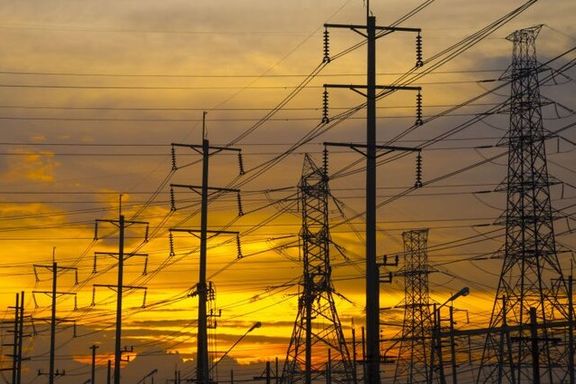
Iran’s capital and several provinces will see a full-day closure of government offices due to a worsening electricity crisis, officials said Monday.
The Tehran governor’s office confirmed all provincial offices will close on Saturday, August 23, as part of energy conservation measures.
The Tehran Electricity Distribution Company also said power would be cut to 100 high-consumption government offices. Provinces including Kerman and North Khorasan declared they would shut down on the same day.
Iranian media reported that the shortages are crippling industrial production and disrupting communications and internet services.
Industry at a standstill
“Units operating three shifts have lost nearly half their shifts entirely," Iran's trade chamber chief Arman Khaleghi told ISNA. "Overall, industries have lost 30 to 60 percent of their production capacity solely due to power shortages."
Khaleghi urged officials to adopt policies of engagement to ease sanctions pressure.
“The country must either engage with the world and leverage regional and international opportunities, or continue oscillating between selling resources to neighbors and importing from them.
This path is neither sustainable nor befitting Iran's economy,” he said.
'Expect internet outages'
The crisis has also taken a toll on daily life.
Dozens of citizens have reported internet disruptions, outages, and slowdowns in recent weeks, compounding the strain from inflation, unemployment, and shortages of power and water.
“We should expect that in the near future, just as we have daily power outages, we’ll also face three-hour daily internet outages,” warned Alireza Rafiei, head of mobile operator Irancell.
He said electricity shortages have rendered backup batteries ineffective, leading to frequent service breakdowns.
“Batteries aren't a viable solution for recurring power cuts, and with such frequent outages, we often can't recharge them. Two hours of daily outages equate to 2 percent of sites being offline 24/7, causing significant dissatisfaction,” Rafiei added.
Sanctions, corruption, and economic mismanagement have deepened the crisis, with Iran’s rial losing more than 90 percent of its value since U.S. sanctions were reimposed in 2018.
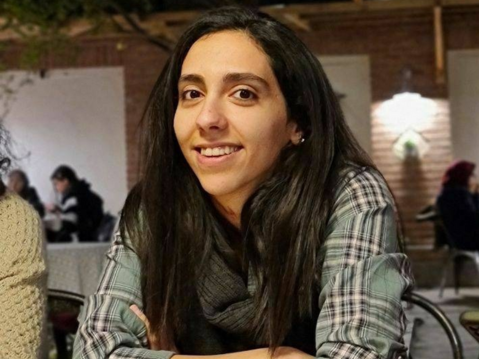
A court in Tehran has sentenced women’s rights defender Hasti Amiri to three years in prison on charges that include propaganda against the state and appearing unveiled in public, she said in a post on Instagram.
Amiri said a Revolutionary Court in Tehran sentenced her to two years in prison and a 500-million rial ($562) fine for “spreading falsehoods.”
She received an additional one year for “propaganda against the state” and a 30.3-million rial ($37) fine for appearing without a hijab in public.
“When simply opposing the death penalty is considered propaganda against the state, then execution itself is a political tool of intimidation,” Amiri wrote.
Amiri, a graduate law student at Tehran’s Allameh Tabataba'i University and a campaigner for students’ rights, previously served seven months of a one-year prison sentence in 2022 for her advocacy against the death penalty and for women’s rights in Iran.
“Speaking about the situation of prisoners and Evin prison has also been considered spreading falsehoods," she added in her post.
The court also imposed additional punishments, including a two-year ban on leaving the country and joining political or social groups.
Reflecting on the ruling, Amiri said her struggle is about standing up for ideals, supporting fellow prisoners, and resisting executions.
"At the end of the day, a person should know how many steps they have taken… With the hope that one day we burn all the gallows and execution scaffolds,” she wrote.
Amiri's sentence comes amid a broader clampdown, with student activist Khashayar Sefidi last year receiving a one-year prison term for propaganda against the state after opposing the death sentence of dissident rapper Toomaj Salehi.